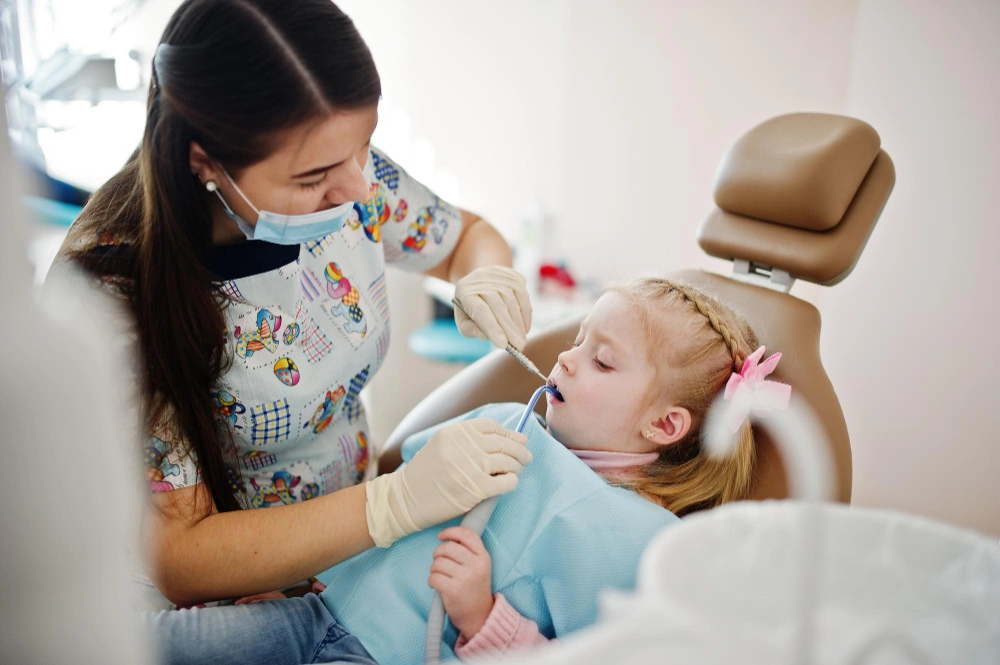Most moms know when to schedule a baby’s first checkup or vaccination, but when it comes to the dentist? That milestone often gets overlooked. Believe it or not, your child’s first dental visit should happen a lot earlier than many parents expect.
From preventing early cavities to setting up a lifetime of healthy habits, early dental care plays a key role in your child’s development. In this guide, we’ll walk you through the best time to schedule that first appointment, what to expect, and how to choose the right dentist for your little one.
Why Baby Teeth Matter More Than You Think
It’s easy to dismiss baby teeth as temporary, they fall out anyway, right? But those tiny teeth do more than help your child chew. They’re essential for speech development, facial structure, and creating the pathway for healthy adult teeth later on.
When baby teeth become infected or fall out too early due to decay, it can cause pain, nutrition problems, and even orthodontic issues down the line. That’s why caring for them from the start is more important than many people realize.

When Should Your Child First See a Dentist?
According to the American Academy of Pediatric Dentistry, your child should visit the dentist by age one, or within six months of their first tooth erupting, whichever comes first.
This early visit isn’t just about cleaning teeth. It’s about:
- Checking for signs of early decay or abnormalities
- Teaching parents how to care for tiny teeth
- Building a positive relationship between your child and the dentist
Starting young also helps your child feel comfortable in the dental chair, avoiding the anxiety many adults carry into adulthood.
What to Expect at the First Dental Visit
The first dental visit is usually quick, gentle, and educational. Here’s what typically happens:
- A simple exam of your child’s teeth, gums, and jaw
- Tips for brushing and teething care
- A conversation about pacifiers, thumb-sucking, and feeding habits
- Possibly a fluoride treatment, depending on your child’s needs
You may be asked to hold your child during the exam. Don’t worry, X-rays or cleanings are usually saved for later visits unless a problem is suspected.
Choosing the Right Dentist for Your Child
Not all dental offices are the same, especially when it comes to kids. You want someone who’s warm, patient, and experienced in treating toddlers.
Look for a provider who offers:
- A welcoming, child-friendly environment
- Experience with pediatric patients
- A team that explains procedures in gentle, simple terms
If you’re located in Minnesota, choosing a local provider can make a big difference in consistency and convenience. For families in the Twin Cities area, scheduling with a trusted dentist in St Paul, MN is a great way to ensure your child’s early visits are positive and tailored to your family’s needs.
How to Prepare Your Child (and Yourself)
Preparing for that first visit can go a long way in creating a calm experience. Here are a few simple tips:
- Read books about the dentist together (like “The Berenstain Bears Visit the Dentist”)
- Play pretend dentist with a stuffed animal to get them used to the idea
- Avoid scary language like “pain,” “shot,” or “drill”, even if you’re just joking
- Schedule wisely: pick a morning appointment when your child is well-rested
Also, bring your questions! This is a great opportunity to get professional guidance on brushing, toothpaste, thumb-sucking, or nutrition.
Common Early Dental Issues to Watch For
Even tiny teeth can run into trouble. Here are a few things to be mindful of:
- Baby bottle tooth decay: often caused by milk or juice before bed
- Teething discomfort: normal, but should be monitored if it’s excessive
- Prolonged pacifier use or thumb-sucking: can affect tooth alignment
- Unusual tooth coloring or spacing: worth asking the dentist about
Catching these early can help prevent more complex (and costly) issues later.
How to Keep Their Teeth Healthy Between Visits
Your job doesn’t end after the appointment, daily care matters just as much. Start building healthy habits early with these tips:
- Brush twice a day with a soft-bristled baby toothbrush and a rice-sized dab of fluoride toothpaste
- Floss once teeth start to touch
- Avoid sugary drinks and sticky snacks
- Don’t put your baby to bed with a bottle
Make brushing a fun family ritual, sing songs, use timers, or try reward charts to build consistency.
Final Thoughts
That first trip to the dentist might feel early, but it’s a small step that makes a big impact. By taking action early and choosing the right provider, you’re setting the foundation for a lifetime of healthy smiles.
Your child’s teeth may be tiny now, but your decisions today will help them grow up confident, cavity-free, and fearless at the dentist’s office.







